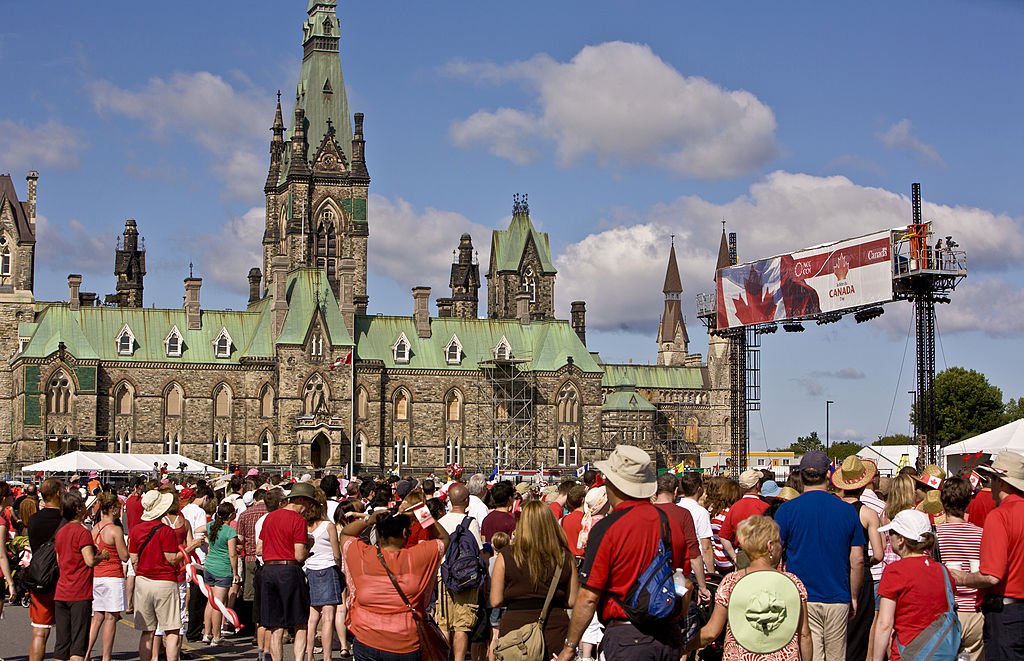Meteorologists and Ottawa Public Health are flagging scorching and near record-breaking heat and humidity levels expected in the national capital on Canada Day — and over the entire long weekend.

Environment Canada forecasts predict temperatures will reach 32 C on Friday and then 33 C on Saturday — peaking at 36 C on Sunday, July 1 (Canada Day).
But those high temperatures on Saturday and Sunday will feel more like 40 to 45 degrees, thanks to sticky air expected to roll in from the southern United States — humidity levels that Global News’ chief meteorologist Anthony Farnell called “potentially dangerous.”
The forecasts for the upcoming long weekend are similar across southern Ontario — and the high temperatures won’t end Sunday. While showers and thunderstorms might bring some “minor relief” on Monday, Farnell said sweltering temperatures “near or above” 30 C are expected to continue through next week.
Farnell suggested people should plan for activities ahead of time that will keep them cool and to avoid being outdoors during the hottest part of the day — typically between noon and 4 p.m.
Because the blistering heat will last over several days, Environment Canada meteorologist Geoff Coulson advised people to stay well-hydrated throughout the weekend; stay in the shade as much as possible; keep a close eye on people, like young children and the elderly, who may not be able to cope with the heat very well; and regularly check on friends and family who don’t have air conditioning.
- Posters promoting ‘Steal From Loblaws Day’ are circulating. How did we get here?
- Video shows Ontario police sharing Trudeau’s location with protester, investigation launched
- Canadian food banks are on the brink: ‘This is not a sustainable situation’
- Solar eclipse eye damage: More than 160 cases reported in Ontario, Quebec
He added UV indexes will be high as well — at around 9 or 10 — making it important to wear sunscreen and hats that protect both the head, ears and back of the neck.
Environment Canada released on Tuesday a special weather statement warning of extreme heat in the city of Ottawa over the Canada Day long weekend. The advisory said overnight temperatures throughout the weekend are expected to fall only to the low 20s, “providing little or no relief from the heat.”
While the high temperatures expected on Sunday aren’t set to break any Ottawa records for Canada Day, Coulson said they won’t be very far off. The hottest day on record for downtown Ottawa on July 1 is 36.7 C, recorded at the department’s site at the Central Experimental Farm in 1931.
However, Twitter account YOW Weather Records — which posts weather alerts using Environment Canada statistics — suggested the long weekend will be Ottawa’s hottest in more than a century.
With thousands expected to descend on downtown Ottawa and Parliament Hill for the July 1 festivities, the city of Ottawa issued its own advisory on Tuesday afternoon, encouraging people who plan to participate in Canada Day events to “limit” their exposure to heat and direct sun by “planning where to seek shelter” throughout the day.
The statement reiterated that extreme heat “can cause dehydration, heat exhaustion, heat stroke and even death,” and said pets, children and elderly people should never be left unattended in vehicles, even if the windows are left open.
“Seniors, infants, young children, outdoor workers and athletes, people who are homeless and people taking certain prescription medications for conditions such as Parkinson’s disease and depression are at a greater risk of suffering from heat-related illness,” the advisory from Ottawa Public Health said.
In addition to drinking water, wearing sunblock with SPF 30 or higher, and wearing appropriate clothing and hats, the city also suggested:
- limiting consumption of caffeine and alcohol;
- avoiding “strenuous” physical activity outdoors;
- taking shelter in air-conditioned locations like shopping malls, libraries and community centres; and
- cooling down at public pools or beaches — or by taking frequent showers or baths, if possible.
“If you cannot shower or bath easily, sponge often with cool wet towels,” the statement advised. “Focus on cooling the back of the neck, under the arms and groin area. Soak feet and hands in a basin of cool water.”
— With files from Kevin Nielsen




Comments